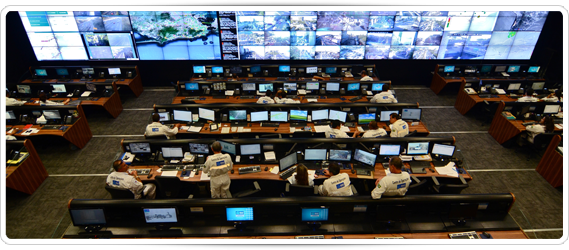Projects
Rio Operations Center
Project Overview
The Rio Operations Center, inaugurated in December 2010, integrates the data and monitoring functions of approximately 30 municipal and state agencies and corresponding utilities under one roof. The center is meant to optimize city functioning, especially in the face of large-scale events, and to respond proactively to emergency situations. After torrential rains and flash flooding in 2010 killed nearly 70 city residents (and scores more in the surrounding state), Mayor Eduardo Paes sought a way to better manage emergencies as well as day-to-day operations in the City. Working with IBM, the City of Rio de Janeiro created a center where utilities, police, the central fire department, the health department, and other relevant agencies can monitor everything from weather, traffic, trash collection, electricity, water, and gas to disease outbreaks and emergency situations. A crisis room also allows the mayor and his advisors to make executive decisions in emergency situations, whether natural disasters or security threats. By increasing efficiency of service delivery and improving responses to outages and service failures, the Operations Center helps Rio de Janeiro become a more sustainable and integrated city, in addition to a safer one.
How to Apply this Project
With over 400 employees working in shifts 24 hours per day, seven days a week, the Rio Operations Center preforms a variety of functions aimed at improving the efficiency, safety, and effectiveness of relevant government agencies in the City. While much of the attention paid to the Center focuses on its emergency monitoring and response, especially related to weather, a significant portion of the work undertaken relates to ensuring smooth functioning of day-to-day operations. Through the center, Companhia Municipal de Limpeza Urbana (municipal waste corporation) can monitor where its trucks are and better sequence trash collection, minimizing gas usage and improving waste management services. Real-time traffic monitors allow transit agency employees to redirect traffic around blockages and provide alternate routes for drivers, reducing stall time for vehicles with public notices. Each agency has a small bank of desks with computers in front of a wall of television monitors, which can show real-time images or be used to run models with IBM's "Smarter Cities" technology. The information managed by the Operations Center is increasingly being developed into citizen-friendly formats, including the social networking site Twitter.

Contact Information
Bruno Neele International Relations, City of Rio de Janeiro Email: bruno.neele@cvl.rj.gov.br
Environmental, Social, and Economic Benefits
The Operations Center is intended to enhance safety and efficiency in the City of Rio de Janeiro, especially in regards to public services like waste, water, sewage, and electricity provision.






